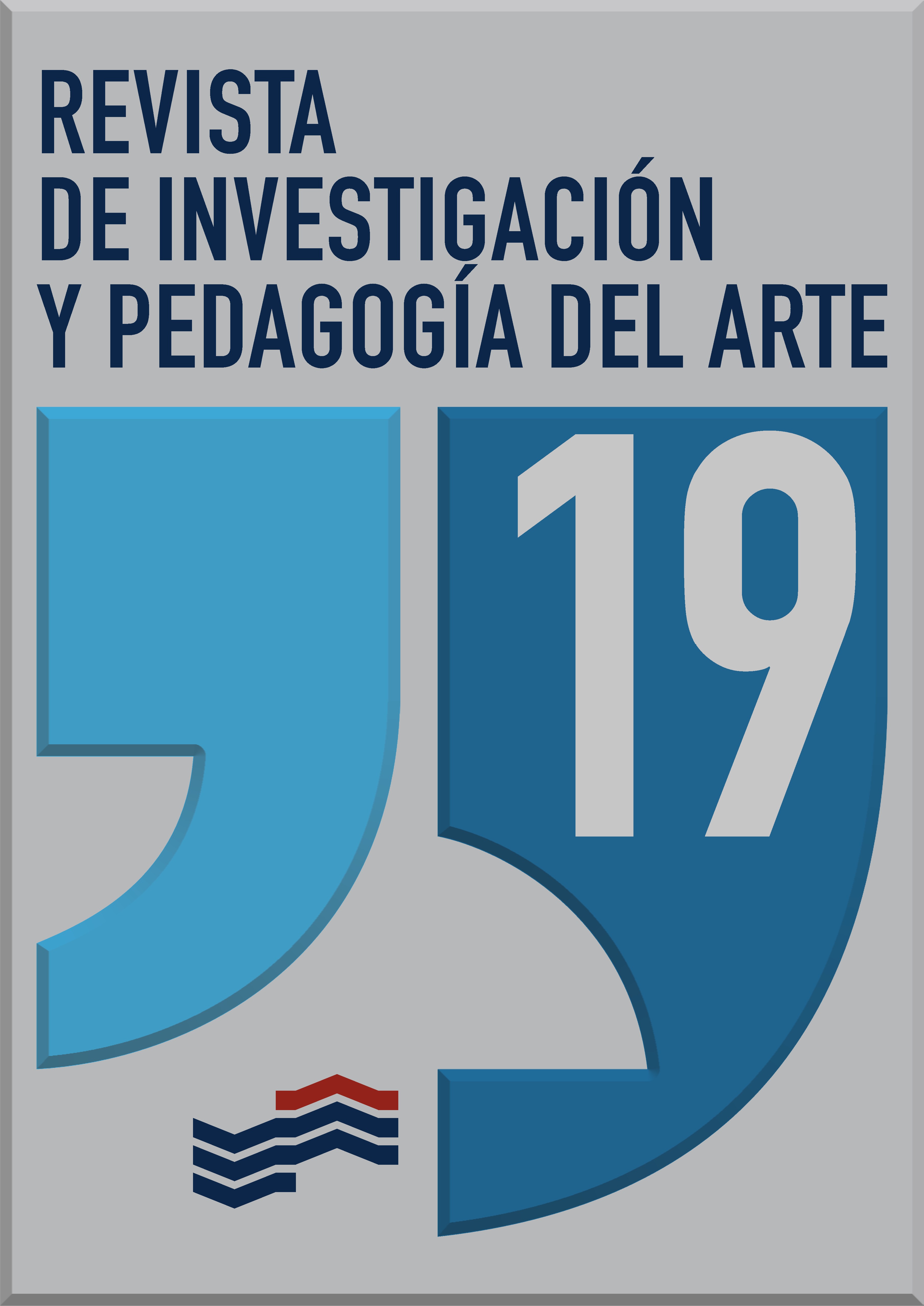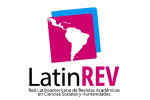Propuestas artísticas educativas gamificadas: una visión dinámica para conocer el patrimonio local en educación superior
DOI:
https://doi.org/10.18537/ripa.19.03Palabras clave:
gamificación, educación superior, patrimonio local, museos, propuesta artísticaResumen
Este estudio analiza la visión de los futuros docentes sobre la gamificación en la enseñanza del patrimonio artístico local analizando las propuestas planteadas por los alumnos del Máster de Profesorado de la especialidad de artes plásticas. El objetivo principal es evaluar cómo perciben los docentes los diferentes parámetros de una gamificación, mediante el modelo de Werbach (Dinámicas, Mecánicas y Componentes), y cómo fomenta la motivación y el compromiso de los estudiantes en entornos museísticos. Se analizaron seis proyectos de gamificación enfocados en patrimonio artístico local, identificando patrones comunes mediante un análisis de palabras clave y evaluaciones temáticas. Los resultados muestran que los componentes cobran aún más importancia frente a las dinámicas o mecánicas, siendo cruciales para la inmersión y personalización de las experiencias. Este estudio contribuye al diseño de prácticas educativas innovadoras, ofreciendo un marco replicable para integrar la gamificación en contextos culturales y educativos.
Descargas
Citas
Bai, S., Hew, K. F., & Huang, B. (2020). Does gamification improve student learning outcome? Evidence from a meta-analysis and synthesis of qualitative data in educational contexts. Educational Research Review, 30, 100322. https://doi.org/10.1016/j.edurev.2020.100322
Bennani, S., Maalel, A., & Ben Ghezala, H. (2022). Adaptive gamification in E‐learning: A literature review and future challenges. Computer Applications in Engineering Education, 30(2), 628-642. https://doi.org/10.1002/cae.22477
Buckley, P., & Doyle, E. (2016). Gamification and student motivation. Interactive Learning Environments, 24(6), 1162-1175. https://doi.org/10.1080/10494820.2014.964263
Chernbumroong, S., Ariya, P., Yolthasart, S., Wongwan, N., Intawong, K., & Puritat, K. (2024). Comparing the Impact of Non-Gamified and Gamified Virtual Reality in Digital Twin Virtual Museum Environments: A Case Study of Wieng Yong House Museum, Thailand. Heritage, 7(4), 1870-1892. https://doi.org/10.3390/heritage7040089
Christian, J. S., Christian, M. S., Pearsall, M. J., & Long, E. C. (2017). Team adaptation in context: An integrated conceptual model and meta-analytic review. Organizational Behavior and Human Decision Processes, 140, 62-89. https://doi.org/10.1016/j.obhdp.2017.01.003
da Rocha Seixas, L., Gomes, A. S., & de Melo Filho, I. J. (2016). Effectiveness of gamification in the engagement of students. Computers in Human Behavior, 58, 48-63. https://doi.org/10.1016/j.chb.2015.11.021
Daldanise, G. (2020). From Place-Branding to Community-Branding: A Collaborative Decision-Making Process for Cultural Heritage Enhancement. Sustainability, 12(24), 10399. https://doi.org/10.3390/su122410399
Dalmina, L., Barbosa, J. L. V., & Vianna, H. D. (2019). A systematic mapping study of gamification models oriented to motivational characteristics. Behaviour & Information Technology, 38(11), 1167-1184. https://doi.org/10.1080/0144929X.2019.1576768
Ferriz-Valero, A., Østerlie, O., García Martínez, S., & García-Jaén, M. (2020). Gamification in Physical Education: Evaluation of Impact on Motivation and Academic Performance within Higher Education. International Journal of Environmental Research and Public Health, 17(12), 4465. https://doi.org/10.3390/ijerph17124465
Fiuza-Fernández, A., Lomba-Portela, L., Soto-Carballo, J., & Pino-Juste, M. R. (2022). Study of the knowledge about gamification of degree in primary education students. PLOS ONE, 17(3), e0263107. https://doi.org/10.1371/journal.pone.0263107
Guo, K., Fan, A., Lehto, X., & Day, J. (2023). Immersive Digital Tourism: The Role of Multisensory Cues in Digital Museum Experiences. Journal of Hospitality & Tourism Research, 47(6), 1017-1039. https://doi.org/10.1177/10963480211030319
Hong, J.-C., Hwang, M.-Y., Liu, Y.-H., & Tai, K.-H. (2022). Effects of gamifying questions on English grammar learning mediated by epistemic curiosity and language anxiety. Computer Assisted Language Learning, 35(7), 1458-1482. https://doi.org/10.1080/09588221.2020.1803361
Hu, K., Wu, H., Qi, K., Yu, J., Yang, S., Yu, T., Zheng, J., & Liu, B. (2018). A domain keyword analysis approach extending Term Frequency-Keyword Active Index with Google Word2Vec model. Scientometrics, 114(3), 1031-1068. https://doi.org/10.1007/s11192-017-2574-9
Huang, R., Ritzhaupt, A. D., Sommer, M., Zhu, J., Stephen, A., Valle, N., Hampton, J., & Li, J. (2020). The impact of gamification in educational settings on student learning outcomes: a meta-analysis. Educational Technology Research and Development, 68(4), 1875-1901. https://doi.org/10.1007/s11423-020-09807-z
Jabali, S. H., Yazdani, S., Pourasghari, H., & Maleki, M. (2024). From bench to policy: a critical analysis of models for evidence-informed policymaking in healthcare. Frontiers in Public Health, 12. https://doi.org/10.3389/fpubh.2024.1264315
Jack, E., Alexander, C., & Jones, E. M. (2025). Exploring the impact of gamification on engagement in a statistics classroom. Teaching Mathematics and Its Applications, 44(1), 93-106. https://doi.org/10.1093/teamat/hrae009
Jurgelaitis, M., Čeponienė, L., Čeponis, J., & Drungilas, V. (2019). Implementing gamification in a university‐level UML modeling course: A case study. Computer Applications in Engineering Education, 27(2), 332-343. https://doi.org/10.1002/cae.22077
Kian, T. W., Sunar, M. S., & Su, G. E. (2022a). The Analysis of Intrinsic Game Elements for Undergraduates Gamified Platform Based on Learner Type. IEEE Access, 10, 120659–120679. https://doi.org/10.1109/ACCESS.2022.3218625
Kian, T. W., Sunar, M. S., & Su, G. E. (2022b). The Analysis of Intrinsic Game Elements for Undergraduates Gamified Platform Based on Learner Type. IEEE Access, 10, 120659–120679. https://doi.org/10.1109/ACCESS.2022.3218625
Krystalli, P., & Arvanitis, P. (2024). Serious Games and Gamification in Foreign Language Learning: Trends and Challenges (2015-2024). Analyzed Through Text Analysis Techniques. European Journal of Education, 7(2), 143-158. https://doi.org/10.26417/gqsf6258
Lee, J., Bae, J., & Bae, Y. (2024). Implementation of a Gamification-Based Metaverse Exhibition: A Case Study of the Farewell Museum. Sustainability, 16(14), 6212. https://doi.org/10.3390/su16146212
Liu, L., Wang, Y., Sinatra, R., Giles, C. L., Song, C., & Wang, D. (2018). Hot streaks in artistic, cultural, and scientific careers. Nature, 559(7714), 396-399. https://doi.org/10.1038/s41586-018-0315-8
Luo, Z. (2022). Gamification for educational purposes: What are the factors contributing to varied effectiveness? Education and Information Technologies, 27(1), 891-915. https://doi.org/10.1007/s10639-021-10642-9
Madsen, K. M., & Jensen, J. F. (2021). Learning through exploration at museum exhibitions. Museum Management and Curatorship, 36(2), 154-171. https://doi.org/10.1080/09647775.2020.1803115
Malamed, C. (2012). Book Review: “The Gamification of Learning and Instruction: Game-Based Methods and Strategies For Training And Education” by Karl Kapp. ELearn, 2012(5). https://doi.org/10.1145/2207270.2211316
Manzano-León, A., Camacho-Lazarraga, P., Guerrero, M. A., Guerrero-Puerta, L., Aguilar-Parra, J. M., Trigueros, R., & Alias, A. (2021). Between Level Up and Game Over: A Systematic Literature Review of Gamification in Education. Sustainability, 13(4), 2247. https://doi.org/10.3390/su13042247
Murillo-Zamorano, L. R., López Sánchez, J. Á., Godoy-Caballero, A. L., & Bueno Muñoz, C. (2021). Gamification and active learning in higher education: is it possible to match digital society, academia and students’ interests? International Journal of Educational Technology in Higher Education, 18(1), 15. https://doi.org/10.1186/s41239-021-00249-y
Naeem, M., Ozuem, W., Howell, K., & Ranfagni, S. (2024). Demystification and Actualisation of Data Saturation in Qualitative Research Through Thematic Analysis. International Journal of Qualitative Methods, 23. https://doi.org/10.1177/16094069241229777
Navarro-Mateos, C., Mora-Gonzalez, J., & Pérez-López, I. J. (2024). The “STAR WARS: The First Jedi” Program —Effects of Gamification on Psychological Well-Being of College Students. Games for Health Journal, 13(2), 65-74. https://doi.org/10.1089/g4h.2023.0059
Nechita, F., & Rezeanu, C.-I. (2019). Augmenting Museum Communication Services to Create Young Audiences. Sustainability, 11(20), 5830. https://doi.org/10.3390/su11205830
Nofal, E., Panagiotidou, G., Reffat, R. M., Hameeuw, H., Boschloos, V., & vande Moere, A. (2020). Situated Tangible Gamification of Heritage for Supporting Collaborative Learning of Young Museum Visitors. Journal on Computing and Cultural Heritage, 13(1), 1-24. https://doi.org/10.1145/3350427
Parra-González, M. E., López Belmonte, J., Segura-Robles, A., & Fuentes Cabrera, A. (2020). Active and Emerging Methodologies for Ubiquitous Education: Potentials of Flipped Learning and Gamification. Sustainability, 12(2), 602. https://doi.org/10.3390/su12020602
Pollack, J., & Adler, D. (2015). Emergent trends and passing fads in project management research: A scientometric analysis of changes in the field. International Journal of Project Management, 33(1), 236-248. https://doi.org/10.1016/j.ijproman.2014.04.011
Rincon-Flores, E. G., & Santos-Guevara, B. N. (2021). Gamification during Covid-19: Promoting active learning and motivation in higher education. Australasian Journal of Educational Technology, 37(5), 43-60. https://doi.org/10.14742/ajet.7157
Ritzhaupt, A. D., Huang, R., Sommer, M., Zhu, J., Stephen, A., Valle, N., Hampton, J., & Li, J. (2021). A meta-analysis on the influence of gamification in formal educational settings on affective and behavioral outcomes. Educational Technology Research and Development, 69(5), 2493-2522. https://doi.org/10.1007/s11423-021-10036-1
Rivera, E. S., & Garden, C. L. P. (2021). Gamification for student engagement: a framework. Journal of Further and Higher Education, 45(7), 999-1012. https://doi.org/10.1080/0309877X.2021.1875201
Rutledge, C., Walsh, C. M., Swinger, N., Auerbach, M., Castro, D., Dewan, M., Khattab, M., Rake, A., Harwayne-Gidansky, I., Raymond, T. T., Maa, T., & Chang, T. P. (2018). Gamification in Action: Theoretical and Practical Considerations for Medical Educators. Academic Medicine, 93(7), 1014-1020. https://doi.org/10.1097/ACM.0000000000002183
Sailer, M., & Homner, L. (2020a). The Gamification of Learning: a Meta-analysis. Educational Psychology Review, 32(1), 77-112. https://doi.org/10.1007/s10648-019-09498-w
Sailer, M., & Homner, L. (2020b). The Gamification of Learning: a Meta-analysis. Educational Psychology Review, 32(1), 77-112. https://doi.org/10.1007/s10648-019-09498-w
Subhash, S., & Cudney, E. A. (2018). Gamified learning in higher education: A systematic review of the literature. Computers in Human Behavior, 87, 192–206. https://doi.org/10.1016/j.chb.2018.05.028
Vega-Oliveros, D. A., Gomes, P. S., E. Milios, E., & Berton, L. (2019). A multi-centrality index for graph-based keyword extraction. Information Processing & Management, 56(6), 102063. https://doi.org/10.1016/j.ipm.2019.102063
Vermeir, J. F., White, M. J., Johnson, D., Crombez, G., & van Ryckeghem, D. M. L. (2020). The Effects of Gamification on Computerized Cognitive Training: Systematic Review and Meta-Analysis. JMIR Serious Games, 8(3), e18644. https://doi.org/10.2196/18644
Xu, J., Lio, A., Dhaliwal, H., Andrei, S., Balakrishnan, S., Nagani, U., & Samadder, S. (2021). Psychological interventions of virtual gamification within academic intrinsic motivation: A systematic review. Journal of Affective Disorders, 293, 444-465. https://doi.org/10.1016/j.jad.2021.06.070
Yildirim, I. (2017). The effects of gamification-based teaching practices on student achievement and students’ attitudes toward lessons. The Internet and Higher Education, 33, 86-92. https://doi.org/10.1016/j.iheduc.2017.02.002
Yu, Z., Gao, M., & Wang, L. (2021). The Effect of Educational Games on Learning Outcomes, Student Motivation, Engagement and Satisfaction. Journal of Educational Computing Research, 59(3), 522-546. https://doi.org/10.1177/0735633120969214
Zeybek, N., & Saygı, E. (2024). Gamification in Education: Why, Where, When, and How? —A Systematic Review. Games and Culture, 19(2), 237-264. https://doi.org/10.1177/15554120231158625
Publicado
Número
Sección
Licencia

Esta obra está bajo una licencia internacional Creative Commons Atribución-NoComercial-CompartirIgual 4.0.










